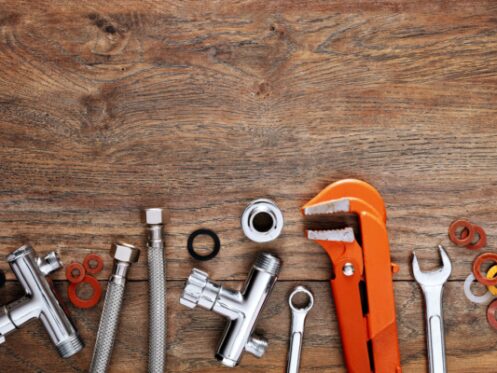Every time winter rolls around here in Denver, CO, homeowners must contend with the threat of freezing water pipes. It’s a problem that can wreak havoc on your home, causing thousands of dollars in property damage and leaving it uninhabitable. To avoid this, understanding how to prevent pipes from freezing and what to do if it happens anyway is critical. By using the right anti-freezing strategy and responding appropriately to a frozen pipe, homeowners can help avert disaster. Here are the best ways to prevent your pipes from freezing and how to handle the situation if they do.
Short-Term Frozen Pipe Prevention Strategies
When it comes to frozen pipes, an ounce of prevention is worth a pound of cure. In other words, stopping frozen pipes before they happen is far easier than fixing them once it’s too late. Therefore, Denver homeowners should use as many freeze-prevention techniques as necessary to safeguard the pipes in their homes. However, since it’s already winter, you must focus on short-term prevention tactics.
With that said, one of the most important things a homeowner can do to keep pipes from freezing in the winter is to leave their home’s thermostat set to a reasonably warm temperature at all times. Although energy costs are a concern, they are nothing compared to the costs of dealing with a frozen and ruptured water pipe. It is a good idea to leave the thermostat set between 65 and 70 degrees Fahrenheit at all times. In addition, if you won’t be home for an extended period in the winter, never set your home’s thermostat below 55 degrees Fahrenheit while you’re away.
Keeping your thermostat set at a relatively toasty level is an effective prevention strategy because the warm air from your heating system will reach exposed indoor pipes and keep them at a steady temperature. You can encourage this by opening your under-sink cabinet doors to allow warm air to circulate around the exposed pipes.
If you have indoor pipes running through an unheated area, like a basement or garage, you can add pipe insulation to protect them from cold air. In situations where that’s impossible, you can leave a faucet served by these exposed pipes slightly on during cold weather. It doesn’t take any more than a slow drip since even a slight trickle of water flowing through your pipes can delay or prevent them from freezing.
Long-Term Frozen Pipe Prevention Strategies
If you are planning ahead, there are several things you can do to minimize the chance that your home’s pipes will freeze in the winter. Most of these things revolve around preventing any cold air from reaching your pipes in the first place. You can begin with some simple caulking.
Before winter hits, hunt for cracks in exterior walls or around doors and windows and seal them with caulk. Doing this helps to prevent cold drafts from entering your home and creating the conditions necessary for frozen pipes. You can also use weatherstripping on your doors and windows to stop drafts that result from poor seals.
Next, add insulation to any unheated parts of your home that have pipes running through them. These areas include unfinished basements, crawl spaces, or anywhere that heat won’t reach. If possible, you can also extend your heating system to cover those areas for even better protection against freezing pipes.
What To Do if a Pipe Freezes
If you’ve neglected to prepare for cold weather or your prevention strategies fail, you’ll need to know how to deal with a frozen pipe. The first step is knowing how to tell if you have one. The most obvious sign of a frozen pipe is when you can’t get cold water to flow out of one or more of your home’s faucets. If this happens, there is a good chance its supply pipe has frozen.
At that point, the smartest thing you can do is to call the expert plumbers here at Summit Heating, A/C, Plumbing & Electrical. They have the expertise to find the frozen part of your pipes and thaw them without damaging other parts of your home. Some homeowners try to relieve the problem on their own, but if you do this, be aware that you could end up doing more harm than good.
To figure out which part of your home’s piping system is frozen, turn on the cold water in each of your home’s faucets. If one of your faucets isn’t flowing, its supply line is most likely the culprit. If more than one faucet has a problem, the main supply line is probably frozen.
Once you figure out which pipe is frozen, you will want to examine any parts of it you can see. Since the visible parts probably come into contact with cold air, there is a good chance that’s where you’ll find the frozen section. If you see any signs of bulges or other damage to a supply pipe, stop what you’re doing and call Summit Heating, A/C, Plumbing & Electrical. Any subsequent steps you take on your own can lead to a costly disaster.
If you do not see any evidence of a pipe bulge or other damage, turn the cold water in the affected faucet all the way up. If you are getting any water flow at all—even a tiny trickle—you’re in luck. If you leave the faucet on for a while, it could be enough to thaw the affected pipe. You can also use a warm towel or heating pad set on low to gently thaw the frozen section. Do not leave the area unattended in case the pipe springs a leak.
Leave It to the Frozen Pipe Experts
If you suspect a frozen pipe, the best thing you can do is contact Summit Heating, A/C, Plumbing & Electrical immediately. Having served the Denver area since 1998, we have seen our fair share of frozen pipes and know how to handle them with care. Our expert plumbers stand a much better chance of fixing a frozen pipe without causing further damage to your home than you do. In addition, they will immediately know if you have a bigger problem on your hands that requires replacing a section of the affected pipe. Making that determination early could save you thousands of dollars worth of damage to your home.
A frozen pipe in your Denver home is most certainly a plumbing emergency, and Summit Heating, A/C, Plumbing & Electrical is here to help. We provide a complete array of plumbing installation and repair services, including pipe repair, drain cleaning, drain repair, leak detection, and sewer services. Plus, we handle HVAC installation, repair, and maintenance. Our experienced technicians pride themselves on being your best option for home services in the Denver area, and we are always there when you need us. If you have a frozen pipe somewhere in your Denver home, give Summit Heating, A/C, Plumbing & Electrical a call, and we will be there to fix it right away!


